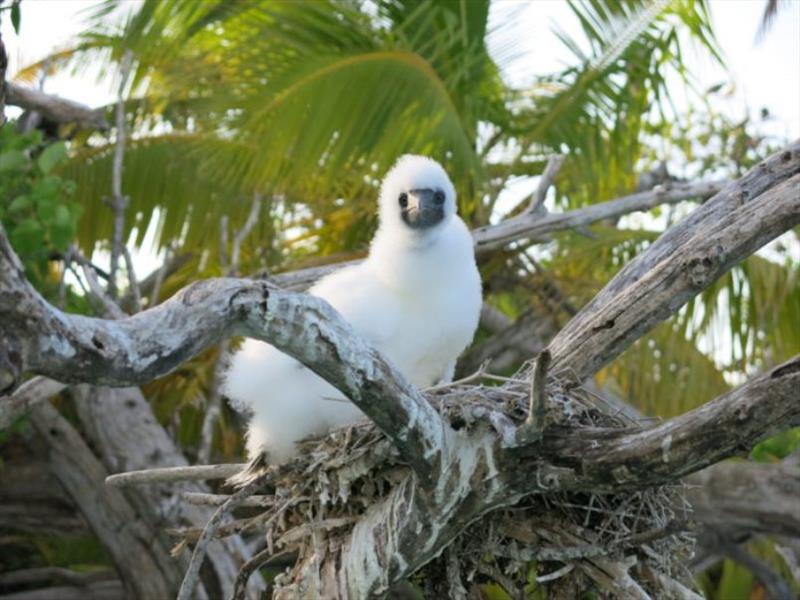
Eradicate rats to bolster coral reefs
by coralcoe.org.au 30 Jul 2018 02:59 BST

A booby chick on the nest, above a coral reef lagoon © Nick Graham
Rat control should be considered an urgent conservation priority on many remote tropical islands to protect vulnerable coral reefs, according to an international team of scientists.
New research has confirmed that invasive rats decimate seabird populations, with previously unrecognised consequences for the extensive coral reefs that encircle and protect these islands.
Invasive predators such as rats – which feed on bird eggs, chicks, and even adults birds – are estimated to have decimated seabird populations within 90% of the world's temperate and tropical island groups, but until now the extent of their impact on surrounding coral reefs wasn't known.
The new study, led by researchers at Lancaster University (UK), ARC Centre of Excellence for Coral Reef Studies (Coral CoE) at James Cook University and Dalhousie University (Canada), examined tropical ecosystems in the northern atolls of the Chagos Archipelago to uncover how rats have impacted surrounding reefs.
Lead author Professor Nick Graham of Lancaster University, said: "Seabirds are crucial to these kinds of islands because they are able to fly to highly productive areas of open ocean to feed. They then return to their island homes where they roost and breed, depositing guano – or bird droppings – on the soil. This guano is rich in the nutrients, nitrogen and phosphorus. Until now, we didn't know to what extent this made a difference to adjacent coral reefs."
An extraordinary set of remote tropical islands in the central Indian Ocean, the Chagos islands provided a perfect 'laboratory' setting as some of the islands are rat-free, while others are infested with black rats – thought to have been introduced in the late 1700s and early 1800s. This unusual context enabled the researchers to undertake a unique, large-scale study directly comparing the reef ecosystems around these two types of islands.
By examining soil samples, algae, and counting fish numbers close to the six rat-free and six rat-infested islands, scientists uncovered evidence of severe ecological harm caused by the rats, which extended way beyond the islands and into the sea.
Rat-free islands had significantly more seabird life and nitrogen in their soils, and this increased nitrogen made its way into the sea, benefiting macroalgae, filter-feeding sponges, turf algae, and fish on adjacent coral reefs.
Fish life adjacent to rat-free islands was far more abundant with the mass of fish estimated to be 50% greater.
The team also found that grazing of algae – an important function where fish consume algae and dead coral, providing a stable base for new coral growth – was 3.2 times higher adjacent to rat free islands.
"These results not only show the dramatic effect that rats can have on the composition of biological communities, but also on the way these vulnerable ecosystems function (or operate)," said co-author Dr Andrew Hoey from Coral CoE at James Cook University.
"Critically, reductions in two key ecosystem functions (grazing and bioerosion) will likely compromise the ability of these reefs to recover from future disturbances."
Professor Graham said: "The results of this study are clear. Rat eradication should be a high conservation priority on oceanic islands. Getting rid of the rats would be likely to benefit terrestrial ecosystems and enhance coral reef productivity and functioning by restoring seabird derived nutrient subsidies from large areas of ocean. It could tip the balance for the future survival of these reefs and their ecosystems."
Associate Professor Aaron MacNeil from Dalhousie University said: "These results show how conservation can sometimes be a bloody business, where doing right by the ecosystem means there is a time to kill. For these invasive rats, that time is now."
The paper "Seabirds enhance coral reef productivity and functioning in the absence of invasive rats," is published in the prestigious journal Nature.
The research was led by Lancaster University (UK) with the ARC Centre of Excellence for Coral Reef Studies (Australia), Dalhousie University (Canada), Department of Biodiversity, Conservation and Attractions, Perth, Australia, University of Western Australia, Australia, Zoological Society of London, UK, University of Exeter, UK, and the International Council for the Exploration of the Sea, Denmark.